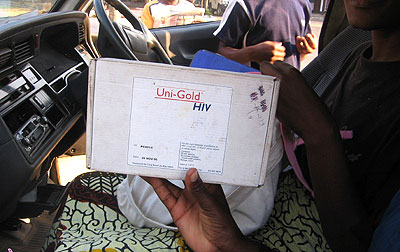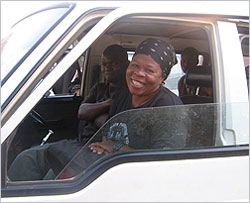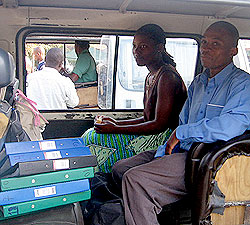UC Berkeley Web Feature
 |
Each
counselor is equipped with a box like this
one. There are gloves and an HIV test inside.
We use two different tests (which are not cheap
here): If one shows up as positive and
another negative, the status is proclaimed
indeterminate. (Photos by Jennifer Browning except where noted) |
A personal and a professional encounter with the Malawian healthcare system
| About Student Journal 2006 [an error occurred while processing this directive] |
BALAKA, MALAWI —Before we got here, our site director said, "I'm the only one who gets sick in Malawi." Yeah, right! He should have said, "I'm the only one who gets malaria."
I have been sick here, but I have successfully avoided getting malaria despite the best efforts of the endless mosquitoes in Balaka — and of the medical staff trying to diagnose me with it.
In July, I had a high fever for a couple of days and ended up going to the hospital. I was convinced it was the flu, but with a temperature of 101°F, I was urged to get tested for malaria. It was late at night so our only option was a private clinic. We pulled up along a dirt road to a completely dark building. Precious, one of our nurse supervisors, found out that the doctor had retired for the night. After such a beginning, I was ready to say "take me home," but we went to fetch him anyway. I am guessing this is an azungu [white person] privilege, but I was too sick to protest.
After waking up the doctor at his home, we drove him back to the clinic. He felt my abdomen and listened to my symptoms of a fever and chill. It all took about one minute. He declared I had malaria and proceeded to prescribe medication. Here is where the cultural difference became apparent. I do not think doctors in Malawi are accustomed to being questioned — especially not by young women, I imagine. I doubt that people here have the same sense of entitlement that we feel in the United States.
But I have it. And I said that I was not taking anything without being tested first, that I had been sick before with a fever when I first arrived and it was not malaria. He was slightly taken aback. He told me that even if I get tested and the results are negative, I could still have malaria. I said that may be true but I want to be tested first. He said he did not have the necessary reagents on hand, but that I should start taking the medicine that night to be on the safe side. He was convinced I had malaria.
I replied that I did not want to take any unnecessary medication without knowing the side effects. This went on for about five minutes, with poor Precious caught in the middle translating. However, with each protest I made, I felt my energy rise and my fever drop. Finally, we bought the medication and decided to go to the hospital in the morning to be tested.
I woke up feeling better, but we went to the hospital anyway. The hospital is divided into large, men' s-and-women' s public wards crammed with people, and a deserted private ward with its own nurse. Do not imagine a modern — that is, spotless and shining — hospital. Although relatively clean, it was an old building with few of the medical machines I was so used to seeing; well-worn sheets and blankets on the beds; and only a few lights on during the day to save electricity. There are women outside in the yard sitting, waiting, and preparing food; none is prepared at the hospital, so it's the relatives' responsibility.
The malaria test was a quick finger prick, and 15 minutes later, they brought back the results. Negative. I know Malaria is over-diagnosed here, but I was relieved all the same. Whenever anyone got sick, people were certain it was malaria, and their concerns had started to rub off when I went to bed after arguing with the doctor. In the doctor' s defense, malaria is very difficult to diagnose, as the symptoms resemble those of many other illnesses — including what we label the flu in the U.S.
To confirm beyond all doubt that I did not have malaria, Precious led me to a doctor who established that I no longer had a fever. I did not realize at the time how lucky I was to see a doctor immediately. There is often only one doctor per hospital. One doctor! That day there were two.
If I could identify anything in Malawi that would make an immediate and measurable difference to quality of life, it would be more doctors. The problem is what we call "brain drain." Many leave for the United Kingdom or other rich countries where they can make much more money. Precious explained that this means nurses here have much greater responsibilities. They can prescribe medicine, and they make all but the most serious decisions in the absence of a doctor. Although the brain-drain problem also applies to nurses, the ones that leave find they have much less responsibility and autonomy in the U.K. or other places.
* * *
 Rose, one of our certified VCT counselors prepares to go to the field in the morning. |
|
 Lucy, a VCT counselor, and Precious, our nurse supervisor, sit in front of a pile of binders. We are in clean-up mode, so each binder represents a village they will visit that day in order to find respondents who have not yet been tested. The black bag at Precious’s feet carries medical supplies in case anyone is ill. |
My other experience with the medical system here involved our own fieldwork. For the final week, I was in charge of the voluntary counseling and testing (VCT) component of our research. We send out two vans of trained VCT counselors supervised by two nurses. They find our respondents in the field and administer two blood tests for AIDS. After they prick people' s fingers, they administer a questionnaire during the 15 minutes it takes for the results. Finally, they have a counseling session.
The idea was not only to determine the HIV prevalence in our districts, but also to find out more about this method of rapid testing. It is a step above health clinics, because the tests are brought to respondents — but that can complicate matters, especially when a husband and wife are both present: they'll know if the other refuses or agrees to be tested. In theory, based on their responses to our main survey, most people seemed willing to accept this type of test in their homes. And in practice, based on the VCT questionnaires I checked, people were consistent — the majority of respondents agreed to be tested.
The VCT questionnaires were much simpler to check than the main survey, but much more emotionally taxing whenever I saw a positive result. It was like a kick in the stomach as I flipped to the results page to see "reactive" circled twice. I know that this basically a death sentence. That person is unlikely to get medical help or most importantly, access to anti-retroviral treatment.
As we drove back from the field one day, I saw green leaves covering the road. I looked up from the results sheets I was checking, and a VCT counselor told me that one line of green leaves meant there was a funeral that day. That day there were two separate lines laid out across the road in the same village.
